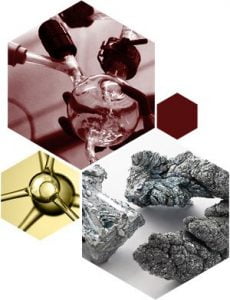
Bismuth (III) Bromide
Properties
- We can offer items in bulk or custom. For other quantities or purities, please request a quotation.
- All prices are subject to change.
Related Products
Information about Bismuth (III) Bromide / CAS 7787-58-8
Bismuth (III) Bromide (BiBr3), also known as bismuth tribromide, is a light-yellow crystalline compound known for its significant role in various industrial and research applications. Bismuth compounds, in general, have gained attention due to their relatively low toxicity compared to other heavy metals, making them suitable for a wide range of applications, from pharmaceuticals to advanced material synthesis.
Bismuth (III) Bromide serves as a versatile precursor in the synthesis of various bismuth-containing compounds. Bismuth Tribromide is used as a mild Lewis acid catalyst in organic synthesis, promoting reactions such as Friedel–Crafts acylations, alkylations, and halogenations. It offers a less toxic alternative to traditional metal halides, making it attractive for green chemistry applications.
In materials science, BiBr3 is utilized in the development of semiconductors and optoelectronic devices. Additionally, Bismuth (III) Bromide has been explored in the preparation of nanomaterials and thin films, contributing to research in the fields of photovoltaics and photonics.
- Christian, T. M., Fluegel, B., Beaton, D. A., Alberi, K., & Mascarenhas, A. (2016). Bismuth-induced Raman modes in GaP1-xBix. Japanese Journal of Applied Physics, 55(10), 108002.
- Saboor, A., Khalid, S., & Janotti, A. (2024). Band-gap reduction and band alignments of dilute bismide III–V alloys. arXiv preprint arXiv:2411.19257.
Safety
- H314 Causes severe skin burns and eye damage.
- H315 Causes skin irritation.
- H319 Causes serious eye irritation.
- H335 May cause respiratory irritation.
- P232 Protect from moisture.
- P233 Keep container tightly closed.
- P260 Do not breathe dust/fume/gas/mist/vapours/spray.
- P364
- P280 Wear protective gloves/protective clothing/eye protection/face protection.
- P285 In case of inadequate ventilation wear respiratory protection.
- P362 Take off contaminated clothing and wash before reuse.
- P301+P330+P331 IF SWALLOWED: Rinse mouth. Do NOT induce vomiting.
- P303+P361+P353 IF ON SKIN (or hair): Remove/Take off Immediately all contaminated clothing. Rinse SKIN with water/shower.
- P304+P340 IF INHALED: Remove victim to fresh air and Keep at rest in a position comfortable for breathing.
- P305+P351+P338 IF IN EYES: Rinse cautiously with water for several minutes. Remove contact lenses, if present and easy to do. Continue rinsing.
- P310 Immediately call a POISON CENTER or doctor/physician.


